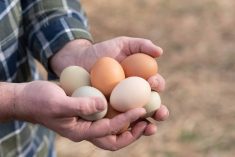According to Ben Graham, the answer is a hard “Yes.”
Graham has a passion for farming. His family has been working the same land near Vulcan, Alta., for 117 years. He’s also the president of AdFarm, the largest agricultural- or rural-focused marketing and communications agency in Canada. Graham understands farming and brands.
We all know about branding in terms of an identifying mark on livestock. However, the meaning of branding is a little more complicated when it comes to your brand for your farm operation and whether or not you need one. Last November, Graham addressed the topic at Farm Forum Event.
One of the simplest definitions of branding is a person’s perception of a product, service, experience or organization, Graham says, the key word being perception.
In today’s world, perceptions about agriculture are important. They affect every facet of our industry. Perceptions about your farm operation are also important. And “shedding a positive light on agriculture” is an important reason your farm should have a brand, says Graham.

“If every farm operation, processor, agribusiness, had a strong brand that was focused on its perception externally, on the positivity of agriculture, we really can move the needle on where we’re at from an agricultural brand globally, locally, provincially, federally. It doesn’t matter how we look at it, when it comes to our brand, the Canadian agriculture brand, globally, it’s well thought of. Our food is believed to be safe. It’s high quality. We have a great environment to grow it in,” says Graham.
People want more information about everything our industry does. Production practices, where our food comes from, who is growing it, sustainability, discussions about carbon emissions, the list goes on. According to Graham, developing brands will help. “These things people want to know more about. And agriculture needs to define its very important role when it comes to these issues people are looking at — whether it’s food safety, quality, food availability in a pandemic, sustainability and climate change, all those things. A brand and a family of brands across our country will help define that.”
Read Also

Avoid these thought traps when investing
Investing for Fun and Profit: Let’s review a list, by renowned fund manager Peter Lynch, of the most dangerous things that stock market investors can say to themselves, or to others.
Setting the facts straight is also an excellent reason for your farm to have a brand. I hear misinformation about farming on an almost daily basis. Building a brand will help dispel misinformation, maintains Graham. “There’s so much misinformation out there that we have to do our part to drive the reality of the business. Ultra-transparency is a term that is being used around the industry to make sure we compensate for that misinformation. And as we work through those things, creating a brand is a tool to get there,” says Graham.
It’s all operations, not just farms of a certain size or those selling specific products or services, that will benefit from having a brand. “You may say, ‘I’m just a wheat and canola grower. I just want to produce as much as I can, on the acre I can, for the best value and the best ROI. My customer doesn’t care.’ But they might tomorrow. We’re seeing this in canola. The message around healthy canola oils and those types of things, that’s going to trickle down to who actually produced it — and we need to be ready.”
Here’s a list of Graham’s pros and cons of creating a brand for your farm operation. The pros include the following:
- You can craft messages that help create opinions and perceptions that are positive about agriculture and your operation.
- You can provide tools people can use to form their own ideas and perceptions about agriculture and to ensure they’re in a light that is positive for yourself, your family, your farm and your community.
- Marketing and product enhancement and value can be created out of a brand.
- As food ingredients become more important, so is the direct relationship with the consumer.
- A strong brand can help you sell from the farm gate.
- If your brand is positioned properly, you can extract extra value from your product because of the raised awareness and positivity around your product or more detailed information available about your product — you can ask more for what you’re doing.
- A brand encourages an openness and connection with your community. It’s important to understand the relationship between your farming operation or ag retail business and your community.
- As you transition the farm from generation to generation, with a strong brand people know what you stand for and what the farm is all about. There will be a solid foundation to enhance and grow the brand when the next generation takes over the farm operation.
The drawbacks to creating a brand for your farm operation include:
- People will want to know more and see more about what you do on your operation. However, our agricultural and livestock practices are the best in the world, and we need to demonstrate that.
- There is a cost to creating a brand if you do it right. Building a website for your farm doesn’t cost a lot, but it’s not free. You’ll need a logo, a statement or a tag line for your operation, and you might need help with that unless you have a relative or know someone who has experience in this area.
If creating a brand seems like a daunting task, as with everything, start small. In my next column, I’ll provide you with Graham’s key steps to building on-farm brands. I can tell you now, they are easy and may ignite, renew, or enhance your excitement and passion about your farm operation.
Stay well,
Kari















